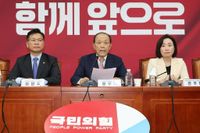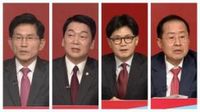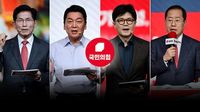In a significant development for South Korea's political landscape, the People's Power party has confirmed the candidates advancing to the second round of its presidential primary. Following a national opinion poll conducted from April 21 to 22, 2025, four candidates have emerged victorious: Kim Moon-soo, Ahn Cheol-soo, Han Dong-hoon, and Hong Joon-pyo. This announcement was made by Hwang Woo-yeo, head of the People's Power presidential candidate election steering committee, during a press briefing on April 22.
The primary process involved a comprehensive survey of approximately 4,000 general citizens, carried out by five polling organizations, each surveying 800 individuals. The results were aggregated to determine the top four candidates, although specific rankings and vote percentages were not disclosed, in accordance with South Korean election laws.
Among the eight initial candidates, the four who did not advance were Na Kyung-won, Yang Hyang-ja, Yoo Jeong-bok, and Lee Cheol-woo. The competition for the final slot was particularly fierce, with Ahn Cheol-soo narrowly defeating Na Kyung-won to secure his place in the second primary. This outcome has set the stage for a two-versus-two battle, where the candidates are divided along pro-Park and anti-Park lines, reflecting the ongoing tensions within the party regarding the impeachment of former President Yoon Seok-yeol.
As the race progresses, the dynamics appear to be shaping into a contest between the pro-Park candidates, Ahn and Han, and the anti-Park candidates, Kim and Hong. The upcoming debates will likely focus heavily on the contentious issues surrounding Yoon's impeachment and the party's future direction.
The second primary is scheduled to take place over two days, from April 27 to 28, 2025, utilizing a voting system that splits the decision equally between party members and a public opinion poll. The results will be announced on April 29, with the possibility of a runoff if no candidate receives a majority of the votes. In such a case, a final selection will occur on May 3, 2025, to determine the party's official presidential candidate.
In response to their advancement, each of the four candidates expressed gratitude and determination. Kim Moon-soo thanked the public for their support and emphasized the need for unity in preserving South Korea's constitutional order. Ahn Cheol-soo highlighted his unique qualifications and pledged to lead the party to victory in the upcoming general election, stating, "I am the only one who can defeat Lee Jae-myung."
Han Dong-hoon, meanwhile, framed his campaign around themes of freedom and change, asserting that he is prepared to confront the challenges posed by the Democratic Party. Hong Joon-pyo, reflecting on the competition, remarked on the significance of the race and the need for a strong conservative voice in the election.
Political analysts are closely monitoring the evolving landscape, noting that the primary results reflect a shift in voter sentiment within the party. The emphasis on the pro-Park and anti-Park factions suggests a deepening divide that could influence the party's strategy moving forward.
As the candidates prepare for the upcoming debates—scheduled for April 24 and 25, culminating in a final debate on April 26—tensions are expected to rise. Each candidate will have the opportunity to present their policies and vision for South Korea, with particular attention to the issues that resonate with voters.
The debates will be broadcasted, allowing the public to engage with the candidates' platforms and make informed decisions ahead of the critical second primary vote. With the stakes higher than ever, the candidates are gearing up for what promises to be a contentious and revealing series of discussions.
As the political climate continues to evolve, the People's Power party faces the challenge of uniting its base while appealing to a broader electorate. The outcome of this primary will not only shape the party's future but also have significant implications for the upcoming presidential election.
In conclusion, the confirmation of Kim Moon-soo, Ahn Cheol-soo, Han Dong-hoon, and Hong Joon-pyo as the four candidates for the second primary marks a pivotal moment in South Korea's political landscape. Their campaigns will undoubtedly reflect the complexities of party dynamics and the broader national sentiment as the country approaches a crucial electoral season.

![[속보]](https://thumbor.evrimagaci.org/O19Fb0NWpcBFDR83hNRQ0fk59_Q=/200x0/tpg%2Fsources%2F8fe46a09-08dd-4868-98d5-21211fb96cb0.jpeg)

![[대선 D-42] 국힘 경선, 김문수·안철수·한동훈·홍준표 4강…찬탄 vs 반탄 '팽팽'](https://thumbor.evrimagaci.org/MVFe40q1IHXAJeW2Xi1kKFu9Eoc=/200x0/tpg%2Fsources%2Fd3de4c41-9584-4693-9123-d88f3685cfeb.jpeg)





